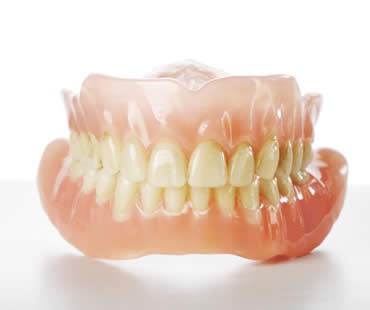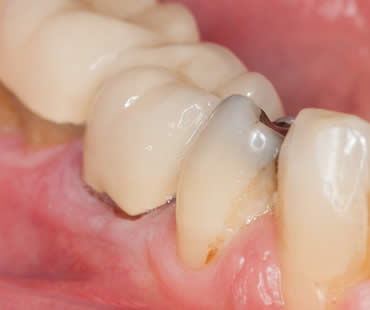
There are few things more irritating than having a painful, swollen sore in your mouth. It bothers you while eating, talking, and even just sitting around. There are a number of types of mouth sores with different causes. Some are infections from bacteria, viruses, or fungus. Or they can be a result of an ill-fitting denture, broken tooth or filling, or loose orthodontic wire. Mouth sores can also be a symptom of a medical condition. Here are some details about common mouth sores.
Canker sore
These small sores occur inside your mouth, and are white or gray with a red outline. They aren’t contagious, but are recurring and can happen one-at-a-time or several at once. Experts believe that lowered immune systems, bacteria, or viruses are risk factors. Canker sores often heal by themselves in about a week, and topical anesthetics or antibacterial mouthwashes may provide relief.
Cold sore
Also called fever blisters, these sores occur outside of your mouth around your lips, nose, or chin. These blisters filled with fluid are caused by the herpes simplex virus type 1, and are extremely contagious. Once you have been infected with the herpes virus, it remains in your body and occasionally flares up. Cold sores usually heal in about a week on their own. Topical anesthetics may help, and your dentist might prescribe antiviral medications to reduce outbreaks.
Candidiasis
Also called oral thrush, candidiasis is a result of the yeast Candida albicans reproducing in large quantities. It usually happens to those with weakened immune systems, and is common with people wearing dentures or with dry mouth syndrome. Candidiasis is also linked to taking antibiotics. Controlling candidiasis is done by preventing or controlling the cause of the outbreak. Ask your dentist for advice.
Leukoplakia
Common with tobacco users, leukoplakia are thick white patches on the inside of your cheeks, gums, or tongue. In addition to tobacco use, they can also be caused by ill-fitting dentures or continual chewing on the inside of your cheek. Leukoplakia is linked with oral cancer, so your dentist may advise a biopsy if the patch looks suspicious.
Contact our dental office in Meriden to schedule a dental checkup.

Once you’ve received dentures to restore missing teeth, it will take some time to get accustomed to them. There’s no reason to be alarmed or frightened about wearing dentures, because most patients go through the same adjustment period. If you’re aware of the potential issues and how to react to them, the process will be easier for you. Here are some rules to follow as you begin wearing dentures.
Don’t try to fix them yourself.
Even though dentures are customized just for you, that doesn’t mean they always fit perfectly right away. There might be some molding defects or other minor flaws that cause the dentures not to fit exactly right or rub sores on your gums. If this happens, don’t try to correct the problem yourself. Take your dentures back to your dentist to explain what’s bothering you, and give your dentist a chance to properly and safely adjust them without damaging the dentures.
Watch your diet.
Similar to getting braces at first, you’ll want to stick to eating soft foods for the first few days of denture wear. Avoid foods that are sticky or hard to chew. Focus on chewing with your back teeth instead of the front part of your dentures, and cut your food into small bites.
Soak your dentures.
Soaking your dentures in a solution recommended by your dentist can help keep them hydrated. This will avoid dryness, which causes friction between your dentures and gums and can lead to mouth sores.
You’re going to unintentionally bite yourself.
It’s part of wearing dentures at first; you’ll probably bite the insides of your cheeks. It’s a natural part of adjusting to the appliance in your mouth, and it will subside as you get used to wearing them. Gargling with a fluoride rinse or other mouthwash provided by your dentist may provide relief.
Schedule your appointment at our Meriden dental office

Receding gums not only look unattractive, they can harm your health. If you notice that your gums are receding, ask your dentist for help so that you can reverse the problem instead of allowing it to worsen. The goal is to catch gum recession early and get it under control before it turns into periodontal disease.
What exactly is gum recession? It’s the condition in which the outer tissue on a tooth begins to wear away toward the root, leading to exposure of your tooth enamel and eventually your tooth’s root. If untreated, receding gums lead to periodontal disease. The best way to avoid this problem is to prevent it from starting in the first place. This is easily done by performing good oral hygiene techniques. Brush twice a day with a soft toothbrush using a circular motion and mild pressure. Also, floss your teeth every day.
If you see that your gums are starting to recede, it’s likely that practicing better dental hygiene will restore your gum health over time. A deep cleaning by your dentist will help kick-start your hygiene routine at home. In some cases, an even deeper cleaning called root planing may be necessary.
For more advanced cases of gum recession, your dentist may need to take tissue from other areas and use it to cover exposed roots. This can boost your gum tissue and make it healthy again. If you experience pain and increased sensitivity due to exposed roots, your dentist may prescribe medications to help.
The main thing to remember about receding gums is that quick action is important. Good dental care is key in both preventing it and in correcting the problem after it has begun. If you notice that your gums are pulling away from your teeth or experience sensitivity, start the healing process as soon as possible by asking your dentist for treatment advice.
We look forward to seeing you in our Meriden dental office

Cosmetic problems with your teeth can make it embarrassing to show your smile. Thanks to dental veneers, you can erase flaws and create a brand new look that will make you want to show off your pearly whites instead of hiding them.
Veneers are very thin shells that are usually made of porcelain. They are custom-made to fit right on top of the fronts of your teeth. The veneers are securely bonded in place so that you can feel confident and comfortable with your smile. The porcelain is matched to the same color as your natural teeth, or a few shades brighter if you’d like to whiten your smile. This material reflects light in the same way that real teeth do, so that others can’t even tell the veneers are there. Porcelain is also very durable, and will not stain like real teeth.
Dental veneers hide many different kinds of problems with your teeth. Some of the most common reasons that people choose to recreate their smiles with veneers include:
- Teeth damaged from injury or decay, including chips and cracks
- Unsightly gaps between teeth
- Stains or discoloration that isn’t corrected with teeth whitening
- Misshapen teeth that do not match the rest of your smile
Veneers are a quick and painless solution. Your natural teeth will be slightly prepared so that the veneers attach properly, but the process is not uncomfortable. Once your veneers are placed, you can expect them to last years without needing to replace them. Maintenance involves routine brushing and flossing just as you would normally, and keeping regular checkups with your dentist.
If you need a dentist in Meriden contact us today

Chances are that you want to have a smile full of sparkly, white, straight teeth. You must not forget about the goal of having a healthy smile too. If you don’t pay proper attention to your mouth, there are a number of diseases and problems that can arise. Poor hygiene causes many problems, from minor to severe, so it’s smarter to make sure your teeth stay in good condition. Follow these suggestions for a healthy smile.
Focus on daily care
Your mouth requires care every single day. You simply can’t perform hygiene tasks once every few days or just when it’s convenient, and expect to have a healthy, attractive smile. Follow your dentist’s instructions on properly brushing your teeth at least twice daily, and flossing every day too. In fact, flossing is just as important to your oral health as brushing! By performing both of these daily tasks, you’ll be able to remove debris and germs and improve your smile.
Choose your products wisely
Select toothpaste that meets your goals. It should always contain fluoride, but you can also choose brands with objectives like tartar protection, improving bad breath, and teeth whitening. You may also want to choose a mouthwash that you can use to quickly clean your mouth, or supplement your other oral care products.
Don’t ignore your dentist
Even if you’re properly caring for your mouth at home, it’s important to continue seeing your dentist regularly. Experts suggest having dental checkups every six months, so your dentist can look for problems like gum disease, cavities, and infections. It’s smart to get any issues treated right away, before things worsen and lead to more costly, painful procedures later.
Schedule your appointment today at our Meriden dental office.

Each year, more than 30,000 Americans receive an oral cancer diagnosis. Unfortunately, less than 57 percent will live beyond five years. In fact, the death rate for oral cancer is higher than cervical cancer, Hodgkin’s disease, brain cancer, and liver cancer. Usually seen in older patients, oral cancer in individuals under 40 is on the rise.
Fast Facts about Oral Cancer
• Early detection increases the survival rate to almost 90 percent.
• Initially, oral cancer patients may have few obvious symptoms of the illness.
• Certain factors, such as gender, lifestyle choices, and age can increase your risk of developing oral cancer. An estimated 25 percent of oral cancer patients, however, have no risk factors for the disease.
• Famous people who have battled oral cancer include Michael Douglas, Roger Ebert, Aaron Spelling, Humphrey Bogart, Eddie Van Halen, and Babe Ruth.
• Signs of oral cancer include a sore that does not heal after two weeks, color change in oral tissue, hoarse or scratchy throat, and difficulty with chewing or swallowing.
• Side effects of oral cancer may include chronic discomfort, loss of oral function, and difficulty in chewing, swallowing, or speaking.
• Research suggests that a diet rich in fruits and vegetables decreases your chances of developing cancerous lesions.
• Routine dental visits allow your dentist to look for signs of oral cancer, which can lead to early detection if there is a problem.
• Tobacco and alcohol use can result in a 75 percent chance of receiving an oral cancer diagnosis.
If you live in the Meriden area contact us today














